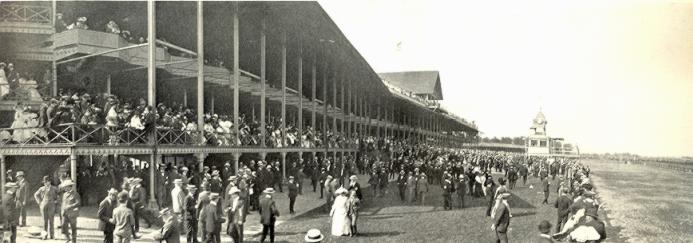
It should come as no surprise that the horses with the longest careers on the racetrack are the ones that have no value in the breeding shed – geldings. Old Rosebud. Exterminator. Kelso. Forego. John Henry. Lava Man. Wise Dan. And most recently, Whitmore. Yet the North American record for races won is held not by a gelding but rather a stallion who raced through the age of ten and won 89 of 138 starts before retiring to a successful stud career. His name was Kingston.
Foaled in 1884 at Castleton Stud in Lexington, Kentucky, Kingston came from prestigious stock indeed. His sire Spendthrift won the Sanford Stakes, Jersey Derby, and Belmont Stakes and was voted co-Champion Two-Year-old Colt. Spendthrift’s line traces back to three significant sires – Lexington, Glencoe, and Boston – making Kingston a valuable breeding prospect. No doubt that his owner-breeder, James R. Keene, had every intention to breed Kingston at the conclusion of his racing career had fate not intervened with his plans.
James Keene was known as a man who made and lost fortunes many times over. When Kingston was a yearling, the Wall Street tycoon had once again found himself in dire financial straits after a failed attempt to corner the grain market. He had no choice but to sell the colt to trainer Evert Snedecker and his partner J.F. Cushman. Kingston showed promise as a two-year-old, winning the Select Stakes, but was unable to defeat Hanover and Tremont. Yet in his loss to Hanover, he caught the eye of that horse’s owners – Phil and Mike Dwyer. They recognized that the improving colt could pose a threat to Hanover so they purchased him for $12,500. Kingston’s impressive bloodlines meant little to the Dwyer Brothers as they obtained their racehorses through purchasing, not breeding. Their stable was all about racing and so Kingston raced. And raced. Then raced some more.
At three, Kingston won 13 of 18 starts, including the Dolphin, Palisade and September Stakes. As a four-year-old he won 10 of 14, including the California and Excelsior Stakes. His victory in the First Select Stakes that year marked the beginning of his three-year domination of that race. While Kingston was winning consistently, he had to earn a championship. That all changed in his five and six-year-old seasons, when he was at last voted American Co-Champion Handicap Male Horse. At five, he won an astounding 14 of 15 races, including the Culver Handicap which he would go on to win three years in a row. At six, he was a model of consistency – winning 9 of 10 races, including the Flight Stakes.
Despite having two championships under his belt, excellent bloodlines and a dizzying win record, Kingston was far from finished. At the age of seven, he set a track record of 1:08 for six furlongs at the Sheepshead Bay Racecourse. He finished the year with 15 wins in 21 starts. At eight, Kingston scored another victory in the Flight Stakes and won 13 of 20 races. At the age of nine, a chink appeared in the old warrior’s armor and he could only manage 9 wins in 25 starts. He raced 9 times as ten-year-old, winning four before at last being retired to stud duty. Throughout his long career, Kingston remained a model of consistency, finishing off the board only 4 times in his 138 starts while amassing earnings of over $140,000.
Kinston proved as successful as a breeding stallion as he had been as a racehorse. He was North America’s leading sire in 1900 and 1910, producing such winners as Ely, Novelty, King’s Courier and Belmont Stakes winner Ildrim. He died in Kentucky at the age of 28 and was one of the first horses to be inducted into the National Museum of Racing and Hall of Fame.



